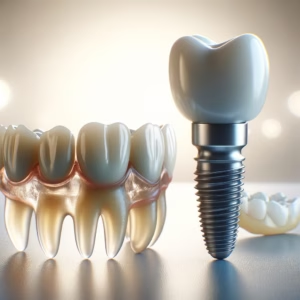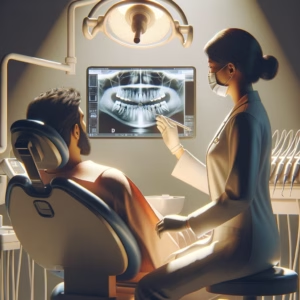Understanding Dental Options for Seniors
As we age, our dental needs can change. It’s important to know about the different options available to help maintain a healthy and functional smile. Here, we’ll explore two common dental choices for seniors: dental implants and dentures. We’ll also discuss their benefits and drawbacks in simple terms.
Dental Implants
What Are Dental Implants? Dental implants are small titanium posts that are surgically placed into the jawbone. They act as artificial roots for replacement teeth, which can be crowns (single teeth) or bridges (multiple teeth).
Benefits of Dental Implants:
- Natural Look and Feel: Implants closely resemble real teeth, making them a great option for aesthetics.
- Stability: Unlike dentures, implants are fixed in place, so you won’t have to worry about them slipping or shifting while eating or speaking.
- Bone Health: Implants can help preserve jawbone health by providing stimulation that prevents bone loss.
- Long-lasting: With proper care, dental implants can last many years, often a lifetime.
Drawbacks of Dental Implants:
- Cost: Implants can be expensive, and not all insurance plans cover them.
- Surgical Procedure: Getting implants requires surgery, which may not be suitable for everyone, especially those with certain health conditions.
- Healing Time: After surgery, there is usually a period of healing before the final tooth can be placed, which can take several months.
Dentures
What Are Dentures? Dentures are removable appliances that replace missing teeth. They can be complete (replacing all teeth) or partial (replacing some teeth).
Benefits of Dentures:
- Cost-effective: Dentures are generally less expensive than implants and are often covered by dental insurance.
- Non-surgical: Getting dentures does not require surgery, making them a suitable option for those who prefer to avoid surgical procedures.
- Quick Solution: Dentures can be made relatively quickly, allowing for a faster return to normal eating and speaking functions.
Drawbacks of Dentures:
- Comfort Issues: Some people find dentures uncomfortable or have difficulty getting used to them. They may cause sore spots in the mouth.
- Maintenance: Dentures require regular cleaning and care, and they may need to be adjusted over time as the shape of the mouth changes.
- Potential Slipping: Unlike implants, dentures can shift or slip when eating or speaking, which can be concerning for some people.
Making the Right Choice
Choosing between dental implants and dentures depends on various factors, including your health, budget, and personal preference. Here are some tips to help you decide:
- Consult Your Dentist: Your dentist can provide valuable insight into which option may be best for you based on your oral health and lifestyle.
- Consider Your Budget: Look at the costs involved in both options and check with your insurance provider to understand your coverage.
- Think About Comfort: If you’re concerned about comfort and stability, dental implants may be worth considering. However, if you prefer a non-surgical option, dentures could be suitable.
Conclusion
Both dental implants and dentures can help restore your smile and improve your quality of life. Understanding the benefits and drawbacks of each option can empower you to make an informed decision that best meets your needs. Remember, maintaining regular dental check-ups is essential, so be sure to keep your dentist in the loop about any concerns or changes in your dental health. Your smile is worth it!
Evaluating Your Dental Health
Assessing your current dental health is crucial, especially as you navigate the various options for tooth replacement in your golden years. Conditions such as gum disease or bone loss can significantly influence your choices between dental implants and dentures. Here’s why evaluating your dental health is important and how it relates to these options.
Importance of Assessing Dental Health
- Identifying Existing Conditions: Regular dental check-ups help identify issues like gum disease, which can weaken the support for your teeth. Early detection allows for treatment that can preserve your natural teeth and make replacements more feasible if needed.
- Understanding Bone Density: Bone loss in the jaw is a common concern for seniors, particularly those who have lost teeth. Dental implants require sufficient bone density to support the titanium posts. A thorough assessment will help determine if you are a candidate for implants or if dentures may be a more appropriate choice.
- Personalized Treatment Plans: Each individual’s dental health is unique. By evaluating your current state, your dentist can create a personalized plan that addresses your specific needs, preferences, and any underlying health conditions.
Conditions That Influence Your Decision
- Gum Disease: If you have gum disease, it may need to be treated before considering implants. This condition can lead to bone loss, making implants less viable. Dentures might be recommended in cases where gum health cannot be restored adequately.
- Bone Loss: Insufficient jawbone density due to missing teeth can complicate the placement of dental implants. If bone loss is significant, your dentist may suggest bone grafting procedures to build up the jawbone, which adds time and cost to the implant process. Conversely, dentures do not require bone density and can be a suitable option even with advanced bone loss.
- Overall Health Considerations: Your general health plays a role in your eligibility for implants. Certain medical conditions or medications may affect healing after surgery. If surgery is a concern for you, dentures present a non-invasive alternative.
Practical Advice
- Schedule Regular Check-ups: Make it a priority to see your dentist regularly. Frequent assessments can help keep track of your dental health and catch any issues early on.
- Ask Questions: Don’t hesitate to ask your dentist about your specific conditions and how they impact your options. Understanding your dental health can help you make informed decisions.
- Consider Maintenance Needs: If you choose dentures, stay informed about their care and maintenance. Regular adjustments may be necessary, especially as your mouth changes over time.
- Stay Informed: Keep abreast of the latest developments in dental health care options. Innovations in materials and techniques may provide solutions that better fit your needs.
Evaluating your dental health is not just about choosing between implants and dentures; it’s a critical step in ensuring you maintain a healthy and functional smile throughout your senior years. By understanding how conditions like gum disease and bone loss influence your options, you can engage in a more informed dialogue with your dental care provider.
Consultation with Professionals
Consulting dental professionals in Ashburn, VA, is crucial for receiving personalized recommendations tailored to your specific dental needs. A professional consultation provides valuable insights that can help you make informed decisions about your dental care options.
What to Expect During a Consultation:
- Comprehensive Examinations: Your visit will typically start with a thorough examination of your mouth, teeth, and gums. The dentist will look for signs of decay, gum disease, and other oral health issues. This may include X-rays to assess the underlying bone structure and any hidden problems.
- Discussion of Medical History: You’ll be asked about your dental and medical history. Be prepared to discuss any medications you are taking and any health conditions that might affect your dental care. This information helps the dentist recommend the most appropriate treatment options.
- Personalized Treatment Plans: After the examination, your dentist will provide a customized treatment plan based on your individual needs. This plan may include options like dental implants or dentures, as well as any necessary preventive care, such as cleanings or treatments for gum disease.
- Cost and Payment Options: The dentist will discuss the costs associated with your recommended treatments and what your insurance may cover. This transparency ensures you understand your financial responsibilities and can plan accordingly.
- Answering Your Questions: A consultation is also an opportunity for you to ask questions. Don’t hesitate to inquire about the procedures, recovery times, and what to expect after treatment. A good dentist encourages open communication and will address any concerns you may have.
- Follow-up Appointments: Depending on your treatment plan, you may need to schedule follow-up visits. Your dentist will outline the necessary steps for ongoing care and monitoring of your dental health.
Consulting with a dental professional ensures you receive expert guidance tailored to your unique situation. This proactive approach helps maintain your oral health and contributes to making informed choices about your dental care.
Financial Considerations
When deciding between dental implants and dentures, financial factors play a significant role. Understanding the potential costs, insurance coverage, and financing options in Ashburn, VA, can help you make an informed decision.
Potential Costs
Dental Implants:
- The average cost of dental implants can range from $3,000 to $6,000 per tooth, depending on various factors such as the surgeon’s expertise, location, and additional procedures like bone grafting if needed.
- The total cost may increase if multiple implants are necessary or if additional treatments are required before the implant placement.
Dentures:
- Complete dentures typically range from $1,000 to $3,000, while partial dentures can start at around $500 and go up to $1,500.
- The costs for dentures vary based on materials used and whether they are custom-made or pre-fabricated.
Insurance Coverage
- Many dental insurance plans offer coverage for dentures since they are considered a more traditional solution for tooth replacement. Coverage can range from 50% to 80% of the total cost, depending on the policy.
- Dental implants are often viewed as a cosmetic procedure, so coverage can be limited. Some insurance plans may cover a portion of the implant cost, but it’s crucial to verify with your provider to understand your specific benefits.
Financing Options
In Ashburn, VA, various financing options can help manage the costs associated with dental implants and dentures:
- Dental Payment Plans: Many dental practices offer financing plans that allow patients to pay for their treatment in installments. These plans can be interest-free or low-interest, making it easier to budget for dental care.
- Health Savings Accounts (HSAs): If you have an HSA, you can use pre-tax dollars to pay for dental procedures, including implants and dentures.
- Credit Options: Third-party financing companies like CareCredit or LendingClub provide credit specifically for dental procedures. These options often come with promotional periods of no interest if paid in full within a certain timeframe.
- Flexible Spending Accounts (FSAs): If your employer offers an FSA, you can set aside pre-tax money for medical and dental expenses, which can include implants and dentures.
Before making a final decision, it’s advisable to discuss all financial aspects with your dentist and insurance provider, ensuring you have a clear understanding of the costs involved and available financing options.
Post-Procedure Care for Dental Implants and Dentures
After choosing between dental implants and dentures, it’s crucial to follow proper aftercare to ensure long-lasting results. Below are clear and actionable guidelines tailored for older adults, covering maintenance routines and follow-up visits for both options.
Care for Dental Implants
Immediate Aftercare:
- Manage Discomfort: Take prescribed pain medications as directed. Use ice packs on the outside of your cheek to reduce swelling.
- Soft Foods Only: Stick to soft foods (like yogurt, mashed potatoes, and smoothies) for the first few days. Avoid hard, crunchy, or sticky foods.
Daily Maintenance Routine:
- Gentle Brushing: Brush your teeth gently with a soft-bristled toothbrush twice a day. Pay special attention to the area around the implant but avoid vigorous scrubbing.
- Flossing: Use an implant-specific floss or a water flosser to clean between the teeth and around the implant. This prevents plaque buildup.
- Antibacterial Mouthwash: Rinse with an antibacterial mouthwash daily to help keep the surgical area clean and free from infection.
Follow-Up Visits:
- Immediate Check-Up: Schedule a follow-up visit with your dentist about a week after implant surgery to monitor healing.
- Regular Check-Ups: Continue with biannual dental check-ups to ensure the implant is stable and the surrounding tissues are healthy.
Care for Dentures
Immediate Aftercare:
- Initial Adjustment: Wear your dentures as instructed, even if they feel uncomfortable at first. Gradually increase wear time to allow your mouth to adjust.
- Avoid Hard Foods: Just like with implants, avoid hard, crunchy foods during the initial adjustment period.
Daily Maintenance Routine:
- Cleaning: Remove and rinse your dentures after meals. Clean them daily with a denture brush and denture cleaner, avoiding regular toothpaste, which can be abrasive.
- Soaking: Soak dentures overnight in a denture-cleaning solution or plain water to keep them moist and prevent warping.
- Oral Hygiene: Brush your gums and any remaining natural teeth twice a day to maintain oral hygiene. Use a soft-bristled toothbrush for your gums and remaining teeth.
Follow-Up Visits:
- Initial Adjustment Appointment: Schedule a follow-up visit within the first week to adjust the fit and address any discomfort.
- Regular Check-Ups: Visit your dentist at least once a year to check the fit and condition of your dentures, as they may require adjustments over time due to changes in your mouth.
By adhering to these care guidelines, seniors can enjoy the benefits of dental implants and dentures while promoting good oral health and ensuring long-lasting results.
Making the Final Decision
When deciding between dental implants and dentures, there are several important factors to weigh:
- Oral Health Status: Your overall dental health and the condition of your jawbone play a crucial role in the feasibility of implants. If your jawbone is insufficient, additional procedures may be necessary, which could influence your decision.
- Cost Considerations: Evaluate the financial implications of both options. While dental implants may offer long-term benefits, the initial investment is generally higher than that of dentures. Review your budget and insurance coverage to determine what is manageable for you.
- Lifestyle Preferences: Consider your daily activities and how each option aligns with your lifestyle. If you lead an active life and prefer a stable solution without the worry of slippage, implants may be more appealing. However, if you desire a quicker, non-surgical solution, dentures could suit your needs better.
- Comfort and Adaptation: Reflect on how important comfort is to you. Some individuals may find the adaptation period to dentures challenging, while others may be more tolerant of the necessary adjustments. Dental implants typically offer a more natural feel, which may enhance your confidence in social settings.
- Long-term Goals: Think about your long-term dental health objectives. If you are looking for a permanent solution with minimal maintenance, dental implants may be the way to go. Conversely, if you prefer flexibility and lower upfront costs, dentures could be more suitable.
Conclusion
Ultimately, the choice between dental implants and dentures should be guided by your personal preferences, health considerations, and financial situation. Prioritizing your comfort and confidence in the decision-making process is essential, as these factors will significantly impact your quality of life and satisfaction with your dental restoration. Take the time to weigh your options thoughtfully, and consult with your dentist to ensure you make the best-informed choice for your smile.






